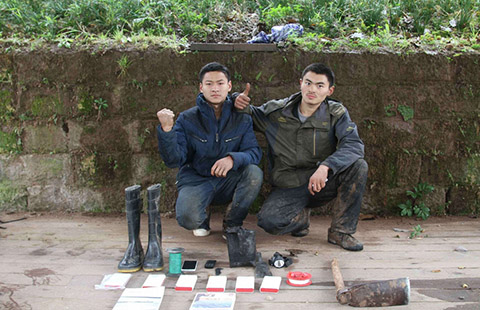New moves carry forward a pioneering spirit
By Sun Ye (China Daily) Updated: 2016-03-04 07:56
In today's economic climate, most Chinese cities that once relied on low value-added, export-oriented growth models need to transform their economic structure.
Foshan is no exception.
The city is a manufacturing hub in South China, whose overall industrial output amounted to 2 trillion yuan ($305 billion) in 2015. It has long been, and still is, one of the country's top cities for the home decoration and electrical appliance industries, with a total output amounting to 700 billion yuan in 2015.
Even with such profitable industries, the city is constantly designing new ways to diversify.
One of these has come with the newly opened high-speed railway that connects Guangdong province, the Guangxi Zhuang autonomous region and Guizhou province. Foshan is the hub for an economic cooperation pilot zone among the three regions that was established as a result of their newly enhanced transportation links.
The pilot zone, designed for further integration of the Pearl River Delta region and to answer the needs of the Belt and Road Initiative, will be a testing ground for innovative policies and new ways of social governance.
It is set to connect the areas from Southwest China to South China with not only high-speed trains but also a more extensive and efficient network of water, air and land transportation.
Plans for complementary development among the three regions are expected to come into effect soon. Foshan, as well as much of Guangdong, has long been one of the country's leaders in trade and manufacturing, while Guizhou has valuable energy and mineral resources and Guangxi is best known as an agricultural base. Smooth leveraging of their strengths and better allocation of their resources would be in favor of their overall development, according to a government assessment of the pilot zone.
A newly bonded region is also expected to bring industries from developed areas such as Foshan to the less-developed inland areas, and create a continuous route for travelers to savor a shifting landscape from coasts to forests and deep mountains within a day.
Internet Plus
Besides going westward inland, Foshan is also pursuing an "Internet Plus" strategy.
In 2015, Foshan introduced an action plan to establish intelligent manufacturing by 2025. It also launched a plan to make the city go "full Internet Plus" last year, in a bid to better connect the players to the market.
Customs clearance has been greatly simplified thanks to the coupled benefits brought by the Internet and reduced procedures. That simplicity is now taking over many other facets of doing business in the city.
Various industry platforms that will enable participating entities to have up-to-date, transparent information on relevant services from logistics to financing are being set up.
E-commerce, which thrives not only in the country but also across borders, will further prosper as the city continues to encourage integration and development of industry chains by providing financing services, logistics, storage and other services.
"One of the keys to cope with economic transition is focusing on high-added value items," said Liu Xiaoming, deputy director of the city's bureau of commerce.
Human resources is one of the reasons why Foshan is emerging as an up-and-coming center for environmental protection, new energy, new materials, biopharmaceuticals and other sunrise industries.
Moreover, a national-level high-tech industrial development zone, a Sino-German industrial service zone and a financial services zone are all progressing swiftly.
All these endeavors haven't gone unrecognized.
The Financial Times' investment promotion publication, fDi magazine, ranked Foshan first on the Chinese mainland in terms of its foreign direct investment strategy and one of Asia's most coveted destinations for FDI last year.
And the city has pledged to take greater strides in the future.
"Even since the late Qing Dynasty (1644-1911), Foshan has been a pioneer in responding to what the times call for and meeting the challenges of different times," Liu said. "It still has that pioneering spirit today."
(China Daily 03/04/2016 page12)
- Suggestions pledged on reform and efficiency
- The project that opened a window to the world
- New faces at National People's Congress
- Digging deep to explore subterranean space
- 110 Long March rockets to be launched in 5 years: scientist
- Mobile HIV testing labs to hit streets in capital
- Veteran journalist named new spokesman of China's top meeting of political advisors
- Elder care seen as a key concern in a graying nation
- Beijing center helps woo foreign talent
- China's lunar probe sets record for longest stay







